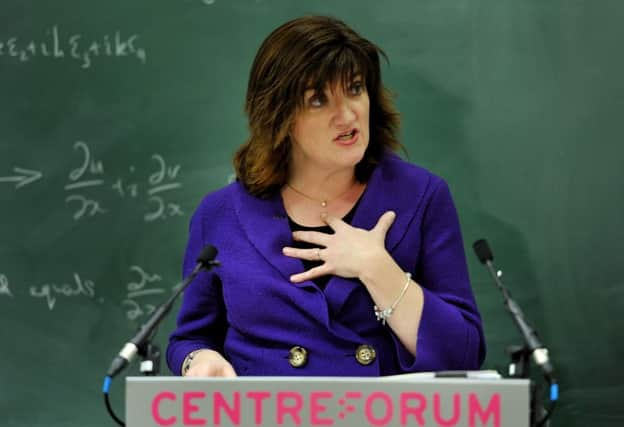All state schools in '˜underperforming' areas could still be forced to become academies


Education Secretary Nicky Morgan had previously announced that ministers would not be pursuing their plan - announced in the Budget - on insisting all state schools become academies by 2022.
This apparent U-turn was hailed as a victory by campaigners opposed to the policy.
Advertisement
Hide AdAdvertisement
Hide AdHowever the new Education for All Bill, confirmed in the Queen’s Speech, is set to create “new laws to expand the academies programme in the poorest performing local authority areas.”
This follows an earlier statement from the Department for Education which said that it was planning to introduce legislation which would trigger all schools in a local area to become academies if a council was found to be failing.
This would apply if a local council could no longer viably support its schools or where “the local authority consistently fails to meet a minimum performance threshold across its schools, demonstrating an inability to bring about meaningful school improvement.”This could mean that the Government would still force some good schools to become academies if the education authority in their area is judged to be failing.
Academies are state-funded schools which are run outside of local council control. They have greater freedoms over their finances, timetable and curriculum.
Most academies are part of larger multi-academy trusts.
Advertisement
Hide AdAdvertisement
Hide AdThe Education for All Bill, aims to “spread educational excellence everywhere” and lists as one of its main benefits changing schools to academies in the worst performing local authorities.
One of the purposes of the bill is to “move towards a system where all schools are academies, and all schools are funded fairly”. It also aims to make the process of becoming an academy “swifter and smoother”, and move responsibility for schools improving from local authorities to “great heads and others in the school system”.
The National Union of Teachers’ general secretary Christine Blower said: “Having failed to gain support for the goal of forced academisation from parents, governors, teachers or head teachers, the Government proposes to take new powers to arrive at the same endpoint.
“Targeting schools in local authorities that the Secretary of State decides to call ‘unviable’ or ‘underperforming’ will fool no one. The scope for political partisanship is clear.”
Advertisement
Hide AdAdvertisement
Hide AdThe Government says the bill is also designed to redress “historical unfairness” in school funding, using a National Funding Formula to ensure money is allocated “fairly and efficiently”.The proposals also place a responsibility on schools when it comes to the next educational steps of excluded pupils.
While the new funding formula has been welcomed by the Association of School and College Leaders, its president Allan Foulds said it is not likely to solve the “severe pressure” faced by school budgets.
He added: “More investment is urgently needed.”
Mr Foulds said the association will await “with interest” more detail on plans around academies, but urged the Government to focus on finding more funds for schools and addressing the “crisis” in teacher recruitment.
The NUT has also criticised the Government over its funding formula announcement, saying it fails to address the real-term cuts hitting schools.
Advertisement
Hide AdAdvertisement
Hide AdMs Blower said: “The struggle to balance school budgets will be made harder by the Government’s plan to rush ahead with a National Funding Formula without the additional funding schools already need.”
Ms Blower said there is an array of issues that need to be dealt with and accused Ms Morgan of being “out of touch”.
Encouraging schools to convert to academies will require the support of multi-academy chains to help improve school performance, especially for those with significant numbers of disadvantaged pupils, the Sutton Trust said.
Chairman Sir Peter Lampl said the Government had “wisely backed away” from forced academisation, and called for a practical approach to the new funding formula.
Advertisement
Hide AdAdvertisement
Hide AdHe said: “As the Government introduces a national funding formula for schools, it is important that they preserve the pupil premium, properly recognise the high cost of teaching pupils living in disadvantaged areas and consider rewarding schools that make a real difference to the results of their poorest pupils.”
The Local Government Association has expressed its concern as to how schools will be held to account if they are stripped from local authority control.
Chairman of the LGA’s Children and Young People Board, councillor Roy Perry, said: “If the statutory role of councils in school improvement and holding them to account ends, parents will have to raise any problems with one of the eight remote Regional Schools Commissioners.
“We have serious concerns about the capacity and local knowledge of each individual commissioner to effectively hold more than 2,500 schools to account - particularly when each RSC already has between 53 and 133 failing academies to turn around.”